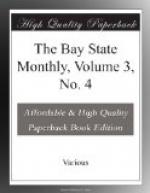Trained by this Indian warfare, the inhabitants of Concord were prepared for the events which were to follow, and when, in 1775, their town furnished the first battle-field of the American Revolution, they were able to offer “the first effectual resistance to British aggression.” In the old church built in 1712 was held the famous Continental Congress where the fiery speeches of Adams and Hancock did so much to hasten the opening of the inevitable conflict between England and her provinces. The same frame which was used for the present building echoed with the stirring words of the patriots as well as with the fearless utterances of the Rev. William Emerson, who, on the Sunday before Concord fight, preached his famous sermon on the text “Resistance to tyrants is obedience to God.” The events which preceded the Revolution need not be recorded here, nor any facts not intimately connected with the history of the town, which had been quietly making preparations for the grand event. Under Colonel James Barrett and Major Buttrick, the militia and other soldiers were drilled and organized, some of whom under the name of Minute-men were ordered to be ready to parade at a moment’s notice. Cannon and other munitions of war were procured, which with flour and provisions were secreted in various places.




